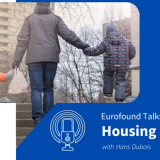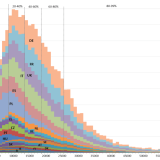Part of Eurofound’s main role is to contribute to the planning and design of better living conditions in Europe. Since 1975, Eurofound has developed a programme of activities around the monitoring and analysis of living conditions and quality of life in Europe. The research involves mapping and analysing key elements for the improvement of living conditions of people, including information on their perception of quality of life and society. The research findings aim to inform the creation of policies to improve living standards and promote social cohesion in the face of economic disparities and social inequalities.
Due to the health and ensuing economic crisis following the COVID-19 pandemic, the study of living conditions and quality of life has gained even more importance. Eurofound investigates the impact of the economic crisis on the living conditions of Europeans in different life stages and the role played by various initiatives implemented to alleviate the social hardship of various groups of citizens. The Agency will continue to monitor trends in this area in light of this new challenge.
European Quality of Life Survey
Eurofound's European Quality of Life Survey (EQLS) documents the living conditions and social situation of European citizens. Launched in 2003, four editions of the survey have been carried out, the latest in 2016. EQLS data on living conditions include information on housing (tenancy type, dwelling inadequacies including energy poverty, housing insecurity), utility arrears, reported difficulties in making ends meet, material disadvantage (deprivation and economising), access to local services, as well as overall satisfaction with standard of living.
Eurofound’s approach recognises that ‘quality of life’ is a broader concept than ‘living conditions’, and therefore has a broad range of indicators that enable an analysis of various living conditions in relation to overall well-being of individuals in a society. In this broader understanding, the EQLS provides information about living conditions in terms of work–life balance and gender equality, quality of life of people with disabilities, and quality of care services. A range of the survey data can help evaluate progress towards implementing the key principles of the Social Pillar and complement indicators of the Social Scoreboard.
Through the EQLS, Eurofound can compare trends over time, which permits some conclusions to be drawn regarding progress towards greater upward convergence in the EU, in terms of Europeans’ living conditions and their quality of life.
A series of reports accompanies each survey edition, including an overview report and a number of more detailed analytical reports.
Living, working and COVID-19
From 2020 to 2022, the five rounds of Eurofound’s e-survey, Living, working and COVID-19, capture the experience of living and working at different stages through the pandemic, with the aim of helping policymakers to bring about an equal recovery from the crisis.
Other living conditions research
Based on various sources and approaches, Eurofound has also looked at the social situation of specific groups, including young people and those over 50, families and young people living with their parents and in multigenerational households, the working poor and the economically inactive population. Research has also been carried out on household over-indebtedness, reducing the non-take-up of social benefits, the living conditions of the Roma, the cost of inadequate housing, as well as living conditions in urban versus rural areas.



















